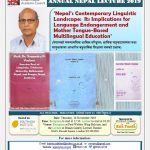News Britain - Nepal Academic Council › News
Latest News
FINAL Conference Programme: BNAC Nepal Study Days, 24-25 April 2025FINAL Conference Programme: BNAC Nepal Study Days, 24-25 April 2025 The final conference programme o...
Read MorePaola Tiné and Alice Millington awarded BNAC PhD Dissertation Prize 2024
April 25, 2024The Britain-Nepal Academic Council (BNAC)’s PhD Dissertation Prize 2024 has been awarded jointly to Paola Tiné (Victoria University of Wellington, New Zealand) and Alice Millington (University of Cambridge). The panel has also named Kathrin Fischer (University of Oxford) and Sudha Ghimire (Tribhuvan University) as runners-up.
Paola Tiné’s chapter, entitled ‘Feeling Social Change in the Gut: Gyāstrik and the Problematisation of Domestic Roles Among Newar Women in Contemporary Nepal’, examines how middle-class women in Bhaktapur experienced and made sense of gyāstrik (an umbrella term for multiple gut disorders) as an embodiment of social change. Tiné’s interlocutors enumerated unmet middle-class expectations of well-being and domestic intimacy as primary causes of gyāstrik. Tiné argues that these accounts demonstrated both the passive and active role of the gut in the social change experience, inviting us to take the gut as the site where somatic modes of ‘attention’ and ‘action’ enable the navigation of personal life trajectories and the negotiation of social change itself. The panel found this chapter highly engaging, written with great fluency and with an excellent critical analysis of the available data. We were particularly impressed by the argument that the medical language of anxiety and depression can hide issues of social injustice.
Alice Millington’s chapter, entitled ‘The fury of the khangba’, argues that the dismissal of Indigenous epistemologies has constrained scholarly understandings of hazards within disaster studies, sometimes leading to failures in the recording of such hazards. Using the stories of the ‘fury of the khangba’, Millington further provides a rich contextualisation of Indigenous understandings of glacial lake outbursts in Walung, Taplejung, that interweave accounts of religious, political and socio-economic catastrophes not usually considered in analyses of geological catastrophes. The panel found this paper a pleasure to read with its highly evocative writing and was impressed by the skilful use of multiple oral, textual and visual sources that made for persuasive arguments.
Kathrin Fischer’s chapter, entitled ‘Between fate and choice – A multi-scalar analysis of migration decisions in Nepal’, puts forward an analysis that combines agentic and structural aspects of decision-making around labour migration that are often separated in the wider literature on empowerment and migration. The paper shows how migration opportunities are simultaneously embraced and negotiated by migrants, but also formed and conditioned by other actors. The paper also makes an excellent contribution to feminist debates on agency, choice and freedom. The panel was particularly taken by the way in which it demonstrated agential change over time and intergenerationally.
Sudha Ghimire’s chapter, entitled ‘Multilayered transformation through participating activities: Building agency and awareness for menstruation hygiene management’, provides an innovative analysis of how teenagers can develop a critical awareness of the ways in which views on menstruation in Nepal are entangled with sociocultural values. Using a multidimensional and participatory research methodology that involves collaborative activities such as pad making and video making, the chapter shows how such processes can contribute to teenage girls becoming change agents for transforming negative views about menstruation. The analysis is grounded in transformative learning theory and provides vital insights into dialogic and transformative spaces for exploring adolescent students’ menstruation related problems, that can be used by parents, teachers and students. The panel was particularly impressed by the way in which the participatory methodology and multidisciplinary approach was presented in the paper.
Our hearty congratulations to the winners and to both runners up.
This year’s BNAC Dissertation Chapter Prize judging panel included Professor Michael Hutt, Dr. Kumud Rana, Dr Bibha Simkhada and Dr Heidi Riley.


